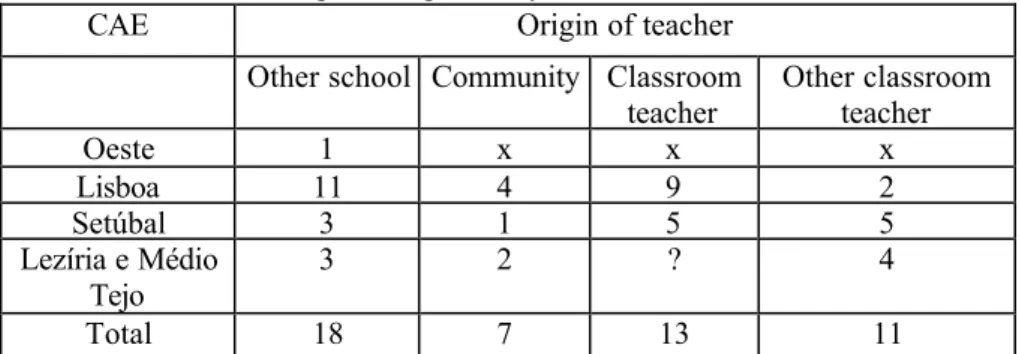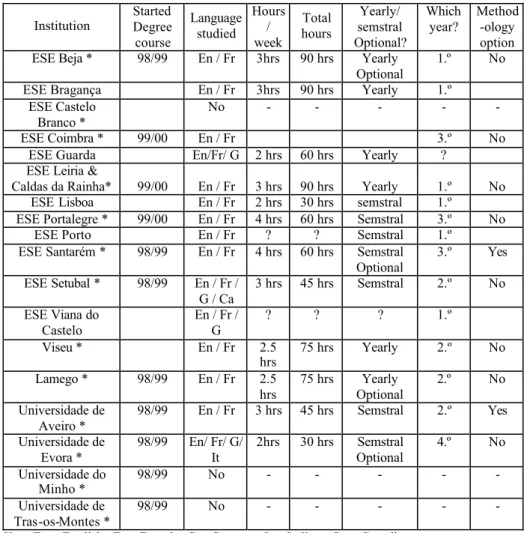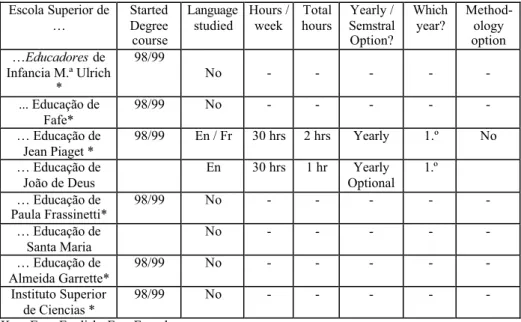Specialist or generalist?
Sandie Jones Mourão*The initiation of a foreign language in Portuguese pre-schools and primary schools is supported by the 'Orientações Curriculares para Educação
Pré-Escolar' (1997:21) and by Ministry of Education legislation, the most recent
being Decreto-Lei n.º 6/2001 do 18/01/01, Artigo 7.º.
Both documents subscribe to a sensitisation model. What is sensitisation? In the literature associated with Modern Foreign Language Teaching in Britain, a sensitisation programme is considered to “promote a broader ‘base line’ competence in language learning skills and a more elementary competence in a foreign language.” (…) (Driscoll 1999: 14 & 15)
It is certain that while working and playing with foreign languages in pre-schools and primary pre-schools we are hoping to make a valuable contribution towards a child’s overall personal development. We want to cultivate their communication skills and improve their understanding of the world. We do not merely teach precoce as a preparation for the future, we are not replacing the initiation of a foreign language in the 2.º cycle.
Who, therefore, should be working with foreign languages at this age group?
Before we go on, I would like to define the following terms: specialist and generalist
A specialist is a language teacher from another cycle, a teacher from a language school or a parent who is a native speaker.
A Generalist is a classroom teacher, primary or pre-school, who has not specialised in any one curriculum area, but works with Portuguese, maths, social sciences, art and craft, drama and PE and a foreign language!
Data obtained from the Ministry of Education show that, during 1998/ 1999, 49 schools in four CAEs in central Portugal were learning English. I have elaborated a table to show who is responsible for the foreign language teaching in these schools.
Just over a quarter of the teachers involved in these projects are the children's primary classroom teachers, the generalists. The remainder are possibly other primary teachers; other teachers from higher cycles or persons who are not connected to the school at all, according to my definition, the specialists. (See table)
Table showing number of schools learning foreign languages in 49 CAEs in central Portugal during school year of 1998 / 1999
CAE Origin of teacher
Other school Community Classroom
teacher Other classroom teacher
Oeste 1 x x x Lisboa 11 4 9 2 Setúbal 3 1 5 5 Lezíria e Médio Tejo 3 2 ? 4 Total 18 7 13 11
There is a great debate about who is best suited to teach a foreign language at primary level. The specialist, an outsider, coming in for two or three sessions a week, or the generalist, who works with the children all day and who is in a position to integrate the foreign language with the children’s everyday learning.
Let us have a look at the specialist and the generalist in terms of a point system. I have awarded a star for each positive attribute the teacher brings into the classroom. Who do you think is able to obtain the most stars?
Specialists Generalists
A specialist teacher is a resource in
him/herself. A generalist can be a resource if FLs are of interest to them. A specialist teacher will bring
available resources for FL learning with him/her, and probably take them away once the session is over.
A generalist has limited access to resources for FL teaching. However, can draw upon other resources within the school and integrate the children’s learning materials/ resources, which will stay in the classroom, for reference at any time. A specialist has high language
proficiency, quality pronunciation, fluency, accuracy and language range. This teacher will have the confidence to code switch and use the FL with ease.
A generalist does not possess the linguistic knowledge, fluency or
confidence to code-switch
spontaneously in the FL. However can understand the children’s language learning difficulties as they probably have them too!
A specialist should have a rich
knowledge of target culture. A generalist has limited intercultural awareness and first hand knowledge of the target culture.
A specialist has a greater specific subject knowledge enabling him/ her to provide for better sequencing, scaffolding and presentation of FL matters.
A generalist has a greater knowledge of general primary pedagogy providing for greater support for the children’s complete learning.
A specialist will respond
productively to pupil error and build on pupil’s comprehension and oral
A generalist is unable to respond productively to specific FL errors, but can encourage other learning
A specialist often holds higher than
necessary expectations,
misunderstanding the language learning experience of such young children.
A generalist is able to focus on children’s comprehension without pressurising them to perform by using the target language at their level.
A specialist has clear long term view of language learning providing ease with long term planning of FL learning only.
A generalist has a clear long-term view of children’s learning in whole sense, not specifically FL learning.
A specialist often encounters difficulty with management of classroom relationships.
A generalist spends all day with the same children, which means he/she knows the children’s personalities and behaviour patterns.
A specialist has difficulty taking into account the children’s cognitive development and attainment in other aspects of the curriculum.
A generalist is able to draw upon his/her working knowledge of children’s cognitive development and attainments in other curriculum areas. A specialist sometimes has problems
connecting the children’s learning and linking it to previous classroom experiences.
A generalist can provide continuity in the children’s learning.
A specialist finds it more difficult to accept disruptions in their timetables, due to other primary activities.
A generalist can easily adapt to disruptions of school life, often still able to incorporate the FL at these times.
It is the age-old argument; a specialist has the foreign language competence but not the pedagogic experience. A generalist has the primary pedagogy but not the foreign language competence. However, look who won! The generalists, no matter how negative their language proficiency may be, their other attributes far outweigh this. They are by far the best teachers for the job.
If we are to approach foreign language learning appropriately, we must take into consideration how young children learn. Younger children are more holistic in learning terms. Their learning needs to be complete and connected. When sensitising children to a foreign language, it needs to be considered part of everything they associate with school and their every day learning. It cannot be separated, given for 45 minutes twice a week, and by someone who has no idea where those children are in their learning curve. Children should not be required to just switch off from English, once their specialist teacher has left the room. Surely, a song can be sung at anytime of day, a rhyme shared, a game played. The classroom teacher can carry the foreign language learning into the rest of the pre-school and primary day providing for sharing and discussion. A generalist teacher who exhibits interest and enthusiasm for language learning stimulates and engenders positive attitudes in children.
I would therefore put forward a case of not either a specialist or a generalist, but instead that the two teachers work together, that projects be created to support generalists who are interested in foreign languages, projects which include the linguistic skills of the specialist and the pedagogic skills of the generalist.
Now let us think about what is being done in Portugal to enable and encourage generalist teachers to work with foreign languages.
Foreign language training for generalist teachers in Portugal
Although things are changing, very few generalists have the linguistic confidence and ability to be able to introduce a foreign language programme. Pre-service courses for educadores and primary teachers do not always include a foreign language sufficiently consistent to allow trainees the opportunity to improve their foreign language skills. Neither are they provided with the methodology, which would give them the opportunity to learn how to use what they do know successfully with their future classes.
the results show how heterogeneous training in foreign languages is on such courses in Portugal. Look at the difference in the number of hours devoted to foreign languages, to the discrepancy between whether it is optional or not. From the replies I obtained it was very clear that generally the course was solely for improving the students' linguistic competence, or for academic reading purposes. According to the results, only Santarém and Aveiro provided any methodology in ensino precoce training at that time.
Table 1 Escolas Superiores de Educação and Universities Institution StartedDegree
course Language studied Hours / week Total hours Yearly/ semstral Optional? Which year? Method -ology option ESE Beja * 98/99 En / Fr 3hrs 90 hrs Yearly
Optional
1.º No
ESE Bragança En / Fr 3hrs 90 hrs Yearly 1.º
ESE Castelo
Branco * No - - - -
-ESE Coimbra * 99/00 En / Fr 3.º No
ESE Guarda En/Fr/ G 2 hrs 60 hrs Yearly ?
ESE Leiria &
Caldas da Rainha* 99/00 En / Fr 3 hrs 90 hrs Yearly 1.º No
ESE Lisboa En / Fr 2 hrs 30 hrs semstral 1.º
ESE Portalegre * 99/00 En / Fr 4 hrs 60 hrs Semstral 3.º No
ESE Porto En / Fr ? ? Semstral 1.º
ESE Santarém * 98/99 En / Fr 4 hrs 60 hrs Semstral
Optional 3.º Yes ESE Setubal * 98/99 En / Fr / G / Ca 3 hrs 45 hrs Semstral 2.º No ESE Viana do Castelo En / Fr / G ? ? ? 1.º Viseu * En / Fr 2.5 hrs 75 hrs Yearly 2.º No Lamego * 98/99 En / Fr 2.5 hrs 75 hrs Yearly Optional 2.º No Universidade de Aveiro * 98/99 En / Fr 3 hrs 45 hrs Semstral 2.º Yes Universidade de Evora * 98/99 En/ Fr/ G/ It 2hrs 30 hrs Semstral Optional 4.º No Universidade do Minho * 98/99 No - - - - -Universidade de Tras-os-Montes * 98/99 No - - - -
Table 2 Private Institutions Escola Superior de … Started Degree course Language studied Hours / week Total hours Yearly / Semstral Option? Which year? Method-ology option …Educadores de Infancia M.ª Ulrich * 98/99 No - - - - -... Educação de Fafe* 98/99 No - - - - -… Educação de Jean Piaget * 98/99 En / Fr 30 hrs 2 hrs Yearly 1.º No … Educação de João de Deus En 30 hrs 1 hr Yearly Optional 1.º … Educação de Paula Frassinetti* 98/99 No - - - - -… Educação de Santa Maria No - - - - -… Educação de Almeida Garrette* 98/99 No - - - - -Instituto Superior de Ciencias * 98/99 No - - - -
-Key: En = English Fr = French
Results obtained by telephone survey and confirmation by questionnaire replies are indicated by *
In-service training is also fairly thin on the ground. Now that the CESEs are over, the replacement Cursos de Complemento de Formação are generally not including foreign languages, although ESE Lisbon and ESE Setúbal are providing a foreign language option, as is ESE Portalegre.
Centros de Formação are certainly not filling the gap in the market. In mid
February 2001, I visited web sites for over 30 Centros de Formação and found only one advertising a credited course for Ensino Precoce de Línguas
Estrangeiras.
Where are the trainers?
Why is Portugal not devoting more energy to training teachers in the ways of ensino precoce, generalists and specialists alike? Could it be that they have no one to do this training effectively?
One of the solutions put into practice appears to be that trained second and third cycle teachers are being given the ensino precoce hours in the ESE timetables! This makes no sense whatsoever! Methodologies for teaching a
specialist in their fields, who have either spent years working with trainees for higher ciclos or themselves taught only children of this age group, be expected to train 1.º ciclo teachers? With the need for input of a more practical nature, based on experience in the field, I believe that these specialists are neither qualified nor comfortable with the responsibility of such a task.
While many countries in the European Community are beginning to take foreign language teaching seriously, Portugal continues to play around with
ensino precoce. It is true that we say, "children need to play with foreign
languages", however training teachers to help children play is no game, it is a matter that needs to be taken very seriously.
"Crianças aprendem línguas estrangeiras a brincar, mas a formação nesta área não é uma brincadeira."
Bibliography
DEPARTAMENTO DA EDUCAÇÃO BÁSICA (DEB) – Gabinete para a Expansão e Desenvolvimento da Educação Pré Escolar. (1997) – Orientações Curriculares para a Educação Pré-Escolar. Lisboa.: Ministério da Educação:
DRISCOLL, P. (1999) – “Modern foreign languages in the primary school: a fresh start.” In Driscoll P & D Frost (eds) The Teaching of Modern Foreign Languages in the Primary School. London: Routledge.


